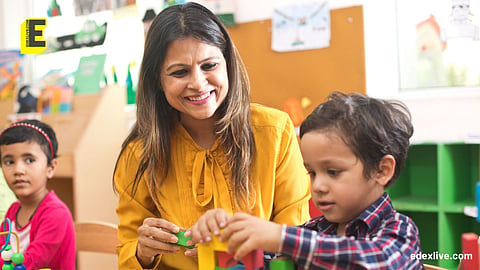

Every morning, millions of India’s youngest children wake up to vastly different educational realities. Some enter well-equipped preschools with trained teachers, while others sit in overcrowded spaces with minimal resources. Some end their day with parents reading stories and engaging in fun conversations at home, while others end with minimal interaction at home.
This disparity leaves an entire section of society behind, even before they start formal schooling. By the time these children enter grade 1, the learning gaps are already staggering. By grade 1, 43% can’t recognise letters of the alphabet, and 35% cannot recognise numbers 1-9. And the gap only widens from here.
Despite massive investments in education, learning outcomes remain stubbornly poor. But what if the solution isn't more of the same? What if we've been looking in the wrong place entirely?
The Foundation: Why the first years hold all the cards
The answer lies in a simple fact: 85% of brain development happens before age six. During these early years, 700 to 1,000 neural connections form every second — a pace of growth that will never be repeated in a lifetime.
A groundbreaking study, funded by the Gates Foundation, from Vellore showed that children who received just 18-24 months of structured, high-quality early childhood education(ECE) scored significantly higher on IQ tests. At age nine, children who had attended ECE averaged an IQ score of 93, compared to 86 for those who had not.
This means those early months (of quality ECE) literally rewired their brains for success. Every story read, every problem solved, and every social interaction was building neural pathways that would serve them for life.
The Opportunity for India
While there is no doubt that ECE can change a child's life trajectory, why should a nation invest in it? What's in it for the country?
Research demonstrates that individuals who receive quality early education are more likely to contribute to the overall productivity of the workforce. Nobel Prize winner James Heckman's research shows a $13 return for every $1 spent on early education. This is 6-10 times return on the initial cost, making it one of the most effective interventions in human development. Moreover, children receiving high-quality early childhood education are 30% more likely to graduate. The Chicago Child-Parent Center Program, which provided ECE to low-income children, showed that participants had higher rates of high school completion, more years of education, and significantly lower rates of juvenile arrest and school dropout.
But here's what makes this particularly relevant for India: we already have the infrastructure. With 1.4 million Anganwadi centres (government-run daycare centres) serving over 8 million children, we're not starting from scratch. While India is making strides with the Poshan Bhi Padhai Bhi initiative, which recognises that nutrition and education must go hand in hand, and national curriculum frameworks for age-appropriate early learning, there’s a long way to go.
Besides enhancing policy and increasing government spending on ECE, we must ensure quality implementation. Every Anganwadi centre could be a cognitive development powerhouse. Every Anganwadi worker (women who run the Anganwadi centres) could be equipped to build stronger minds, not just supervise children.
The path forward
Government and policymakers must increase investments in the early childhood ecosystem, prioritising resource allocation with the same urgency given to other national priorities. This means robust training for Anganwadi workers to provide quality early learning, improving the infrastructure of these centres, and creating awareness around early childhood education. It must play a central role in ensuring equitable access and reimagining Anganwadi centres as joyful learning and growing hubs.
Communities and families must champion early childhood education as the foundation for all other educational efforts. We must make early learning joyful and play-based, not just drilling letters and numbers. Families should actively engage with children through reading, storytelling, and play.
To become a truly developed nation it is critical to invest in human resources for the future from now itself. Thus, India needs long-term strategic investments in its youngest citizens, providing them quality early childhood education.
In conclusion, the evidence is clear, the infrastructure exists, and the policy frameworks are in place. What we need now is the collective will to act on what science has shown us: that the first few years don't just matter — they matter most.
(This piece is written by Utsav Kheria- Co-Founder, Rocket Learning and Shreya Goyal, Manager – Rocket Learning. Shreya is a Teach For India alumni.)
